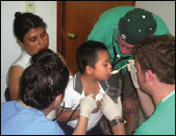Partnership with Angel Notion Clinic
- Peter LaPine
- Department of Communicative Sciences and Disorders
- College of Communication Arts and Sciences

Peter LaPine and medical students assist a young patient at the Angel Notion Clinic.
Playa del Carmen is a beautiful resort town in the Yucatán peninsula, yet the native Mayan population lives in impoverished conditions. Medical and educational services are often unavailable or unaffordable. Even when such options are available, the Mayans simply view everything—both good and bad—as a gift of God. To correct a speech-language disorder caused by a stroke, for example, might be a contradiction to God's will. In fact, the Mayans do not have a definition for the language disorders common to stroke rehabilitation. They also do not have an organized system of health care.
In the United States, problems such as cleft lip and palate would normally be treated by a multidisciplinary team, typically including a pediatrician, dentist, orthodontist, plastic surgeon, otolaryngologist, prosthodentist, psychologist, audiologist, and speech-language pathologist. In Playa del Carmen they are either treated in the clinic operated by Angel Notion, a local nonprofit organization, or not treated at all.
It is this cultural mindset which Peter LaPine hopes to change. Dr. LaPine first began partnering with Angel Notion in 2000, when he, several colleagues, and about a dozen graduate students worked at a school for special needs students. Almost all of the 109 students in the school had primary hearing impairments with associated speech/language and educational deficits. Rather than focusing only on clinical work, the MSU students gave daily presentations in Spanish to the teachers, parents, and community members on special needs issues and their treatments.
Since that time, the program has continued to grow steadily. About 3,000 families have been touched by the 270 people who have accompanied LaPine on his 18 medical trips to Mexico. Accordingly, he wants to continue to develop the educational aspects of his work. Partnering with several Mexican universities and the Angel Notion clinic, he is developing a telemedicine and distance learning program that will train local young people to assist impoverished parents in recognizing potential health problems. These aides will also learn to train parents on nutrition and child development issues. LaPine also hopes to design a "real-time" cleft-palate clinic that would operate from Playa del Carmen. Students at Michigan State would view and participate in the clinical process; MSU faculty would then pass along recommendations to parents and professionals in Mexico.
LaPine has found, since beginning his work in Mexico in general and with Angel Notion in particular, that his research interests have become more broad and his style more flexible. "I could limit my research to voice restoration following laryngeal cancer and help one or two people a day," he said, "or I could expand my interests and help one or two hundred." He has also learned about adaptability in general. Having few of the modern resources a typical United States resident would take for granted, the Mayans have figured out ways to adapt to their difficulties. "One patient missing the bone and joint structures of the wrist," LaPine recounted, "uses the top of a shoe as a brace." It is this sense of adaptability he hopes to impart to his students. "Structures and techniques are important," he said, "but so are creativity and adaptability."
- Written by Lisa Eldrid, University Outreach and Engagement